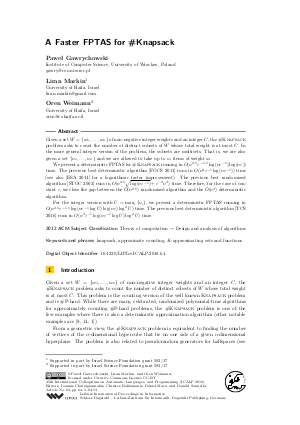A Faster FPTAS for #Knapsack
Authors Pawel Gawrychowski, Liran Markin, Oren Weimann
-
Part of:
Volume:
45th International Colloquium on Automata, Languages, and Programming (ICALP 2018)
Part of: Series: Leibniz International Proceedings in Informatics (LIPIcs)
Part of: Conference: International Colloquium on Automata, Languages, and Programming (ICALP) - License:
 Creative Commons Attribution 3.0 Unported license
Creative Commons Attribution 3.0 Unported license
- Publication Date: 2018-07-04
File

PDF
LIPIcs.ICALP.2018.64.pdf
- Filesize: 484 kB
- 13 pages
Document Identifiers
Subject Classification
ACM Subject Classification
- Theory of computation → Design and analysis of algorithms
Keywords
- knapsack
- approximate counting
- K-approximating sets and functions
Metrics
- Access Statistics
-
Total Accesses (updated on a weekly basis)
0Document
0Metadata
Abstract
Given a set W = {w_1,..., w_n} of non-negative integer weights and an integer C, the #Knapsack problem asks to count the number of distinct subsets of W whose total weight is at most C. In the more general integer version of the problem, the subsets are multisets. That is, we are also given a set {u_1,..., u_n} and we are allowed to take up to u_i items of weight w_i.
We present a deterministic FPTAS for #Knapsack running in O(n^{2.5}epsilon^{-1.5}log(n epsilon^{-1})log (n epsilon)) time. The previous best deterministic algorithm [FOCS 2011] runs in O(n^3 epsilon^{-1} log(n epsilon^{-1})) time (see also [ESA 2014] for a logarithmic factor improvement). The previous best randomized algorithm [STOC 2003] runs in O(n^{2.5} sqrt{log (n epsilon^{-1})} + epsilon^{-2} n^2) time. Therefore, for the case of constant epsilon, we close the gap between the O~(n^{2.5}) randomized algorithm and the O~(n^3) deterministic algorithm.
For the integer version with U = max_i {u_i}, we present a deterministic FPTAS running in O(n^{2.5}epsilon^{-1.5}log(n epsilon^{-1} log U)log (n epsilon) log^2 U) time. The previous best deterministic algorithm [TCS 2016] runs in O(n^3 epsilon^{-1}log(n epsilon^{-1} log U) log^2 U) time.
Cite As Get BibTex
Pawel Gawrychowski, Liran Markin, and Oren Weimann. A Faster FPTAS for #Knapsack. In 45th International Colloquium on Automata, Languages, and Programming (ICALP 2018). Leibniz International Proceedings in Informatics (LIPIcs), Volume 107, pp. 64:1-64:13, Schloss Dagstuhl – Leibniz-Zentrum für Informatik (2018)
https://doi.org/10.4230/LIPIcs.ICALP.2018.64
BibTex
@InProceedings{gawrychowski_et_al:LIPIcs.ICALP.2018.64,
author = {Gawrychowski, Pawel and Markin, Liran and Weimann, Oren},
title = {{A Faster FPTAS for #Knapsack}},
booktitle = {45th International Colloquium on Automata, Languages, and Programming (ICALP 2018)},
pages = {64:1--64:13},
series = {Leibniz International Proceedings in Informatics (LIPIcs)},
ISBN = {978-3-95977-076-7},
ISSN = {1868-8969},
year = {2018},
volume = {107},
editor = {Chatzigiannakis, Ioannis and Kaklamanis, Christos and Marx, D\'{a}niel and Sannella, Donald},
publisher = {Schloss Dagstuhl -- Leibniz-Zentrum f{\"u}r Informatik},
address = {Dagstuhl, Germany},
URL = {https://drops.dagstuhl.de/entities/document/10.4230/LIPIcs.ICALP.2018.64},
URN = {urn:nbn:de:0030-drops-90687},
doi = {10.4230/LIPIcs.ICALP.2018.64},
annote = {Keywords: knapsack, approximate counting, K-approximating sets and functions}
}
Author Details
Funding
- Markin, Liran: Supported in part by Israel Science Foundation grant 592/17
- Weimann, Oren: Supported in part by Israel Science Foundation grant 592/17
References
-
Mohsen Bayati, David Gamarnik, Dimitriy Katz, Chandra Nair, and Prasad Tetali. Simple deterministic approximation algorithms for counting matchings. In STOC, pages 122-127, 2007.

-
Ilias Diakonikolas, Parikshit Gopalan, Ragesh Jaiswal, Rocco A. Servedio, and Emanuele Viola. Bounded independence fools halfspaces. In FOCS, pages 171-180, 2009.

-
Martin Dyer. Approximate counting by dynamic programming. In STOC, pages 693-699, 2003.

-
Martin Dyer, Alan Frieze, Ravi Kannan, Ajai Kapoor, Ljubomir Perkovic, and Umesh Vazirani. A mildly exponential time algorithm for approximating the number of solutions to a multidimensional knapsack problem. Combinatorics, Probability and Computing, 2:271-284, 1993.

-
Parikshit Gopalan, Adam Klivans, and Raghu Meka. Polynomial-time approximation schemes for knapsack and related counting problems using branching programs. arXiv 1008.3187, 2010.

-
Parikshit Gopalan, Adam Klivans, Raghu Meka, Daniel Štefankovic, Santosh Vempala, and Eric Vigoda. An FPTAS for #Knapsack and related counting problems. In FOCS, pages 817-826, 2011.

-
Nir Halman. A deterministic fully polynomial time approximation scheme for counting integer knapsack solutions made easy. Theoretical Computer Science, 645:41-47, 2016.

-
Nir Halman, Diego Klabjan, Mohamed Mostagir, Jim Orlin, and David Simchi-Levi. A fully polynomial-time approximation scheme for single-item stochastic inventory control with discrete demand. Mathematics of Operations Research, 34(3):674-685, 2009.

-
Raghu Meka and David Zuckerman. Pseudorandom generators for polynomial threshold functions. In STOC, pages 427-436, 2010.

-
Ben Morris and Alistair Sinclair. Random walks on truncated cubes and sampling 0-1 knapsack solutions. SIAM journal on computing, 34(1):195-226, 2004. Preliminary version in FOCS 1999.

-
Yuval Rabani and Amir Shpilka. Explicit construction of a small epsilon-net for linear threshold functions. In STOC, pages 649-658, 2009.

-
Romeo Rizzi and Alexandru I. Tomescu. Faster FPTASes for counting and random generation of knapsack solutions. In ESA, pages 762-773, 2014.

-
Daniel Štefankovič, Santosh Vempala, and Eric Vigoda. A deterministic polynomial-time approximation scheme for counting knapsack solutions. SIAM Journal on Computing, 41(2):356-366, 2012.

-
Dror Weitz. Counting independent sets up to the tree threshold. In STOC, pages 140-149, 2006.

